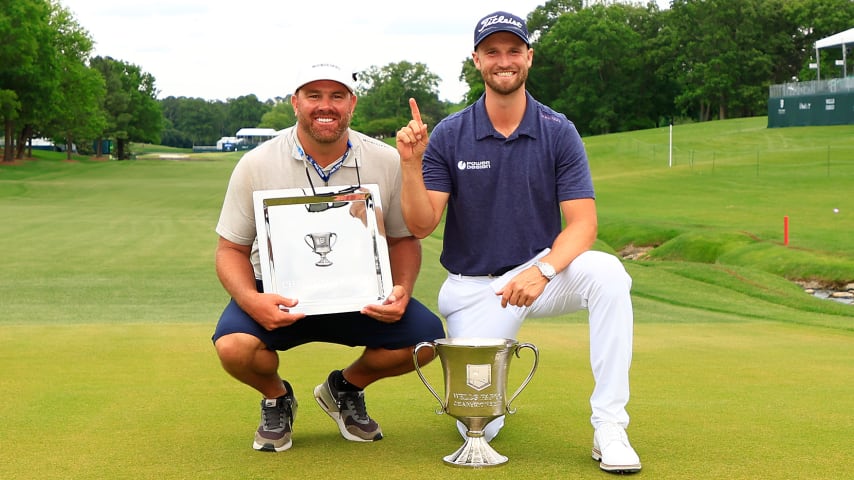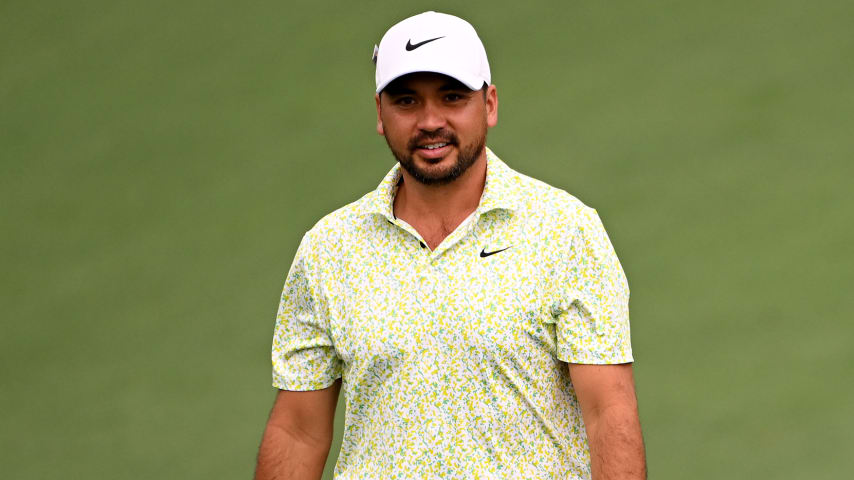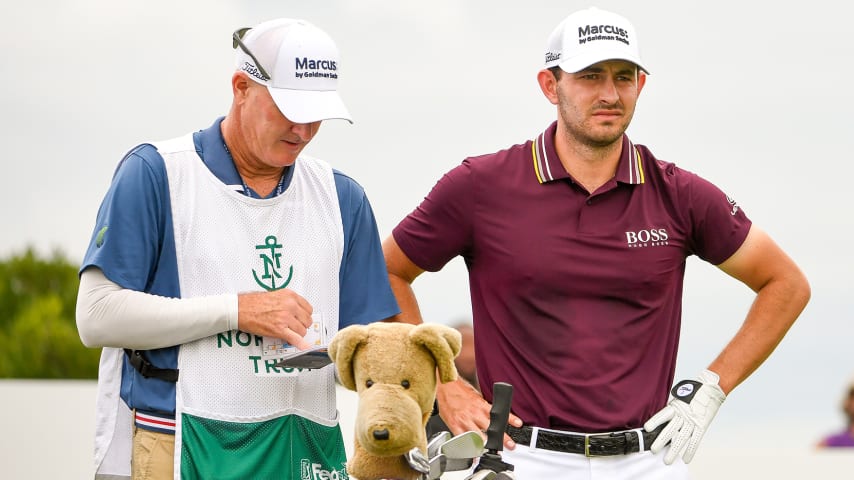Wyndham Clark rides attitude adjustment to Wells Fargo victory
5 Min Read

‘It was either that or quit,’ he said of his transformation
Written by Cameron Morfit
‘It was either that or quit,’ he said of his transformation
CHARLOTTE, N.C. – Every tournament is a referendum on the mental game.
This was thrown into high relief when Giannis Antetokounmpo, after his Milwaukee Bucks got bounced from the NBA postseason, said not every loss was a failure, a speech so raw and real that it went viral. It especially resonated on the PGA TOUR, where even Tiger Woods’ winning percentage (22%) reminds that failure lurks around every dogleg.
“We are all just a bunch of losers at the end of the day,” Xander Schauffele said.
“You either win or you learn,” Tony Finau added.
Which brings us to Wyndham Clark, who shot a final-round 68 to win the Wells Fargo Championship by four over Xander Schauffele (70). A phenomenal talent whose results were not matching up with his skillset, Clark, the 2017 Pac-12 Player of the Year at Oregon, could no longer ignore the reason. He was fragile – his word – and living and dying with every shot.
After watching him lose his cool time and again, his team insisted he address it.

Wyndham Clark’s news conference after winning Wells Fargo
“It was either that or quit,” Clark said. “I just wasn’t having any fun.”
So began a journey in which he went all-in on the mental side, which meant not only seeing a sports psychologist but diving into books like “The Obstacle is the Way” by Ryan Holiday and “The Energy Bus” by Jon Gordon. You could say it’s worked nicely.
After a nervous start in which Clark yanked his opening drive into the gallery, bogeyed the first hole and failed to birdie the par-5 seventh, Schauffele caught him and even took a one-stroke lead. Undeterred, Clark went 5 under in a 10-hole stretch to take a five-shot lead into 18.
The old him? He would have gotten emotional and found a way to beat himself.
“I felt like today when I didn't have the best start early on, I just told myself to relax, I have a lot more holes,” said Clark, whose first PGA TOUR win came in his 134th start and paid $3.6 million. “You can't win the tournament after the first few holes on a Sunday – little things where in the past I would have gotten fast and quick and already my mind's going forward.”
Clark was third in Strokes Gained: Putting for the week despite coming in 74th in that stat on the season. He also led the field in Strokes Gained: Approach the Green and SG: Tee-to-Green. This despite the fact that he ranked 63rd in Driving Accuracy, hitting 23 of 56 fairways.
What was harder to measure was just how far he’d come mentally.
Clark first considered quitting golf a decade ago, after his mother, Lise, died of breast cancer. She was the one who started him in golf, driving him to tournaments, and she brought him back to center when the game drove him to distraction. Without her, he would lose his composure in qualifiers at Oklahoma State – he started in Stillwater before transferring to Oregon – and stay angry.

Wyndham Clark remembers late mother’s impactful lessons
That tendency followed him all the way to the professional ranks – until he resolved to fix it.
Clark would need his newfound equanimity at Quail Hollow. He admitted his start Sunday would have derailed him in the past.
“I didn't want to be the person that I was in previous Sundays in previous years,” he said, “because that person, you know, probably shoots 2, 3 over today or even more and loses his head and gets mad out there and doesn't control his emotions.”
On the contrary, he birdied the eighth and par-5 10th holes. Meanwhile, Schauffele began to show cracks, spraying his drives as he bogeyed Nos. 9 and 11 as Clark retook the lead. He extended that lead to four shots with a birdie on 12, then made more birdies on 14 and 15.
The rout was on, and Clark didn’t look so fragile anymore.
“A buzzsaw,” Schauffele said.

Wyndham Clark’s Round 4 winning highlights from the Wells Fargo
Clark moves from 36th to fifth in the FedExCup, and with a newfound poise and confidence at age 29 could remain a potent force for the remainder of this season and beyond.
“He’s really talented, he hits it really far, and he’s an amazing chipper,” said Tony Finau, whose coach, Boyd Summerhays, used to also coach Clark. “He’s got some tangibles that are really good for high-level golf.
“If he figures it out mentally,” Finau continued, “which he has been – and really working on it, is what it sounds like – he can be a force out here, no question.”
Asked about Clark, his coach at Oregon, Casey Martin, texted, “Great kid. Driven. Almost to a fault. Wants it bad. Hard worker. Great athlete.” He cited Clark's partnership with caddie/coach John Ellis, who played for Oregon and was an assistant there, as especially impactful.
Ellis, whose professional career included nine PGA TOUR starts and a career-best T24 at the 2010 Fortinet Championship, agreed that the old Clark could have let this tournament slip away.
“We got off to a bad start, a nervy start,” he said. “Before, we’ve had a few chances to win and he would hit a few bad shots and let it go away, right? It would affect him. He never wavered.”
What’s next for Clark?
“He has the work ethic to be the best player in the world,” Ellis said. “To win against this field, on this course, the next step will be feeling comfortable in majors, but the sky is the limit.”
Clark himself probably wouldn’t disagree, but for now he’ll savor this one. There were times, he admitted, when he told those closest to him that a victory just might never happen. Not for him.
“Honestly, it's really, it's surreal,” he said. “I've dreamt about this since I was probably 6 years old. Since I've been on the PGA TOUR, you fantasize about it all the time, and I've done it multiple times this year where I catch myself daydreaming about winning, and to do it at this golf course against this competition is better than I could ever have imagined.”











